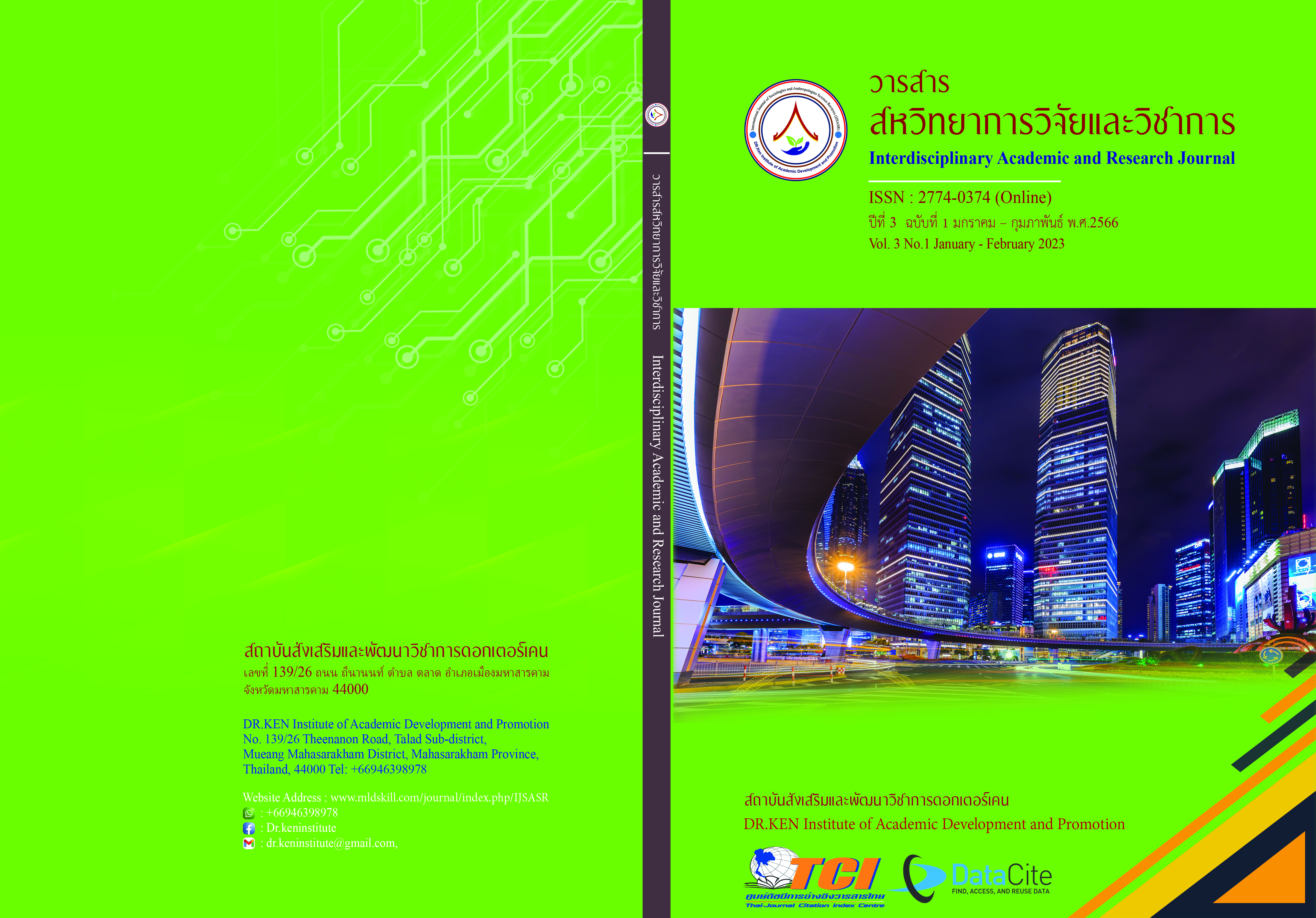Administrative Factors Affecting the Effectiveness of Mission Operations of Damrongtham Center, Mueang Sakon Nakon District, Sakon Nakhon Province
DOI:
https://doi.org/10.14456/iarj.2023.9Keywords:
Administrative Factors; , Operational Effectiveness;, Damrongtham District CenterAbstract
"Dharma Damrong Center, Ministry of Interior" since April 1, 1994. The Ministry of Interior has the policy to adjust the role of the Ministry of Interior Damrongdharma Center to be more proactive than reactive. As a result, the Damrongdhamma Center of the Ministry of the Interior has a role in providing justice to people seriously. Its work is proactive rather than reactive, making people aware of the roles and responsibilities of the Damrongdhama Center widely, and can request help when they face various difficulties at all times. Thus, this research was: (1) to study the level of administrative factors of Damrongtham Center, and the effectiveness level of operating the missions of Damrongtham Center. (2) to investigate the influences of administrative factors on the mission effectiveness of Damrongtham Center. And (3) to explore and gain guidelines for developing the effectiveness of operating the missions of Damrongtham Center. The sample group as well as the target group included 270 government officials and staff who handled the people’s complaints in every sub-district, district, and province for Mueang Sakon Nakhon Damrongtham Center. Data were collected by questionnaire, and statistics were frequency, percentage, mean, standard deviation, and Multiple Linear Regression Analysis. The results found that (1) Overall administrative factors of Damrongtham Center were at a high level while the effectiveness of operating the missions of Damrongtham Center as a whole, was also at a high level (µ= 4.28). (2) Administrative factors significantly influenced the effectiveness of operating the missions of Damrongtham Center was at <.05 statistical level with all administrative factors, the information technology contained the most influence (β = .354). At the same time, leadership gained the second most influence (β = .208), and the organizational culture had the third most influence (β = .193), respectively with a predictive coefficient of .338, it could be explained that these administrative factors could be used to correctly predict the effectiveness of operating the missions of Damrongtham Center for 33.80% (Adjusted R2 = .338). (3) the guidelines for improving the effectiveness of operating the missions of the Damrongtham Center were; (A) Online computer system, information technology system, as well as other innovations, should be provided for the services and database transfer. (B) An electronic complaint system should be developed instead of using paper-based writing forms. The Dhamrongtham Center’s authorities and missions together with its procedures, methods, and documents required for filing the complaints should be publicized to speed up and facilitate the orders of the processes. (C) The personnel of Dhamrongtham Center should be sent to attend pieces of training so that they would have the knowledge, experience, and expertise needed for receiving and tackling complaints. The tasks of this person should be improved for better efficiency. And (D) Center should be adequately equipped with various facilities such as people’s seats for service users, a parking lot, restrooms, drinking water, and so on.
References
คมสรรค์ ศัตรูพ่าย. (2564). ปัจจัยการบริหารที่ส่งผลต่อประสิทธิผลการบริหารเครือข่ายความร่วมมือทางวิชาการโรงเรียนวิทยาศาสตร์จุฬาภรณราชวิทยาลัย. วารสารบัณฑิตศึกษา. 18(81), 153-163.
โชคสุข กรกิตติชัย. (2560). ศูนย์ดำรงธรรม กระทรวงมหาดไทย. เอกสารวชาการอิเล็กทรอนิกส์ สำนักวิชาการ สำนักงานเลขาธิการสภาผู้แทนราษฎร. Retrieved on April 5, 2022 from: http://www.parliament.go.th/library.
ปะการัง ชื่นจิตร. (2562). การประเมินขีดความสามารถขององค์การสาธารณะ: กรณีศึกษาศูนย์ดำรงธรรม กระทรวงมหาดไทย. การประชุมวิชาการระดับชาติและนานาชาติ มหาวิทยาลัยศรีปทุม ครั้งที่ 14 ประจำปี 2562.
พิชิตศักดิ์ รากเงิน. (2560). ความสัมพันธ์ระหว่างปัจจัยทางการบริหารกับการบริหารจัดการสถานศึกษา โดยใช้โรงเรียนเป็นฐานของโรงเรียนสังกัดองค์การบริหารส่วนจังหวัดร้อยเอ็ด. วารสารมหาวิทยาลัยมหามกุฏราชวิทยาลัย วิทยาเขตร้อยเอ็ด. 6 (2), 162-173.
ภรัณยู มายูร. (2561). บทบาทของศูนย์ดำรงธรรมอำเภอในการแก้ไขปัญหาความเหลื่อมล้ำในเขตอำเภอบรบือ จังหวัดมหาสารคาม. วารสารการเมืองการปกครอง. 8(1), 81-94.
สำนักงานคณะกรรมการพัฒนาระบบราชการ (2564). การพัฒนาคุณภาพการบริหารจัดการภาครัฐ. Retrieved on April 5, 2022 from: https://www.opdc.go.th/content/Nzc
สำนักงานท้องถิ่นอำเภอเมืองสกลนคร จังหวัดสกลนคร. (2564). ผังโครงสร้างศูนย์ดำรงธรรมอำเภอเมืองสกลนคร. สำนักงานท้องถิ่น อำเภอเมืองสกลนคร จังหวัดสกลนคร.
สำนักงานปลัดกระทรวงมหาดไทย. (2554). คู่มือการดำเนินงานแก้ไขปัญหาร้องเรียน/ร้องทุกข์. ศูนย์ดำรงธรรม สำนักตรวจราชการและเรื่องราวร้องทุกข์. กรุงเทพฯ: สำนักปลัดกระทรวงมหาดไทย.
เสนาะ กลิ่นงาม. (2551). การพัฒนารูปแบบการจัดการความรูในมหาวิทยาลัยราชภัฏ. กรุงเทพ ฯ: มหาวิทยาลัยรามคำแหง.
อมรศักดิ์ กิจธนานันท์. (2558). การประเมินศูนย์ดำรงธรรมมิติใหม่ตามทัศนะเจ้าหน้าที่ศูนย์ดำรงธรรมจังหวัด ศูนย์ดำรงธรรมอำเภอ และประชาชนผู้มารับบริการ. สถาบันบัณฑิตพัฒนบริหารศาสตร์.
เอกรัฐ หลีเส็น. (2560). การเพิ่มประสิทธิภาพ ประสิทธิผล ภารกิจศูนย์ดำรงธรรมจังหวัดเพื่อตอบสนองยุทธศาสตร์ชาติ ระยะ 20 ปี (2561-2580) ด้านการสร้างโอกาสความเสมอภาคและความเท่าเทียมทางสังคมศึกษาเฉพาะกรณีศูนย์ดำรงธรรมจังหวัดนราธิวาส. หลักสูตรการป้องกันราชอาณาจักร รุ่นที่ 60 ประจำปีการศึกษา พุทธศักราช 2560–2561.
Downloads
Published
How to Cite
Issue
Section
License
Copyright (c) 2023 Kanthaporn Wuttingam, Samart Aiyakorn , Chardchai Udomkijmongkol

This work is licensed under a Creative Commons Attribution-NonCommercial-NoDerivatives 4.0 International License.
Copyright on any article in the Interdisciplinary Academic and Research Journal is retained by the author(s) under the under the Creative Commons Attribution-NonCommercial-NoDerivatives 4.0 International License. Permission to use text, content, images, etc. of publication. Any user to read, download, copy, distribute, print, search, or link to the full texts of articles, crawl them for indexing, pass them as data to software, or use them for any other lawful purpose. But do not use it for commercial use or with the intent to benefit any business.
















.png)


